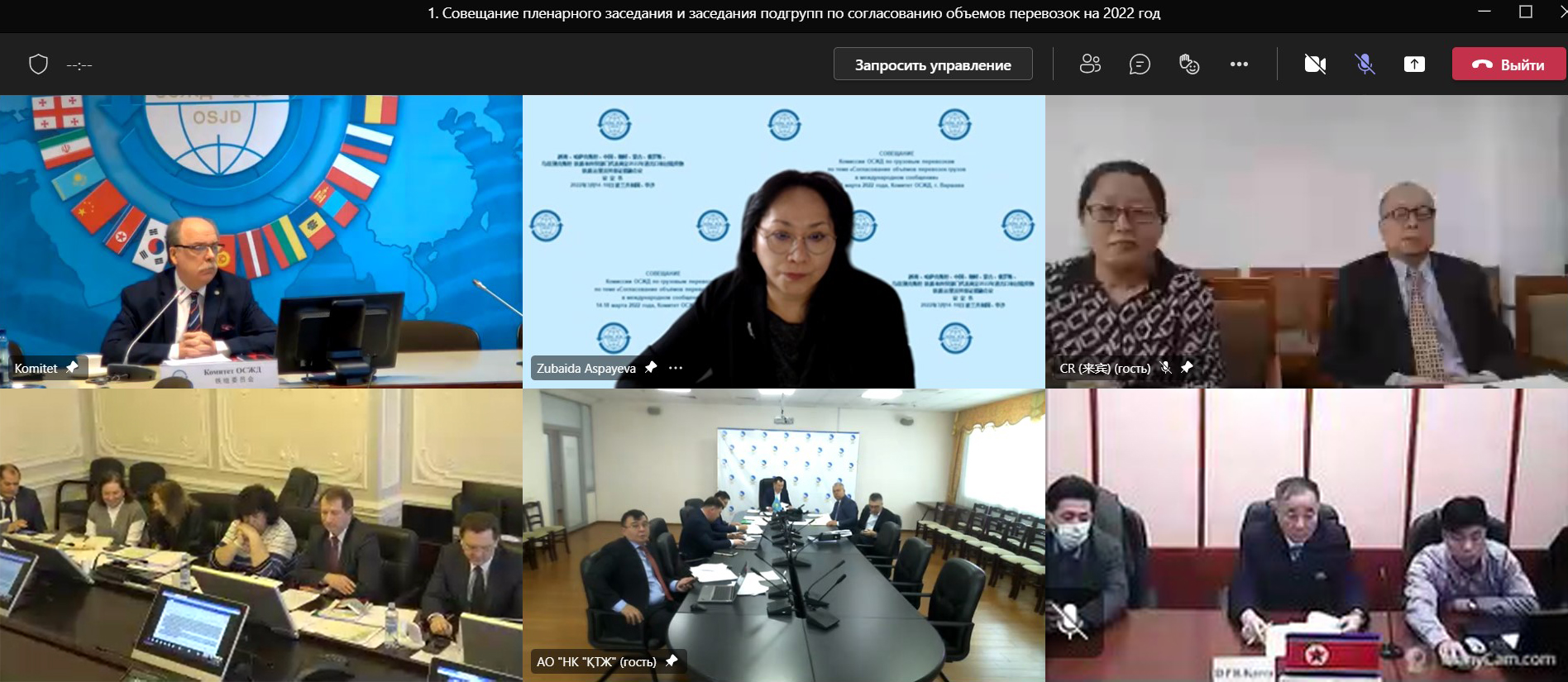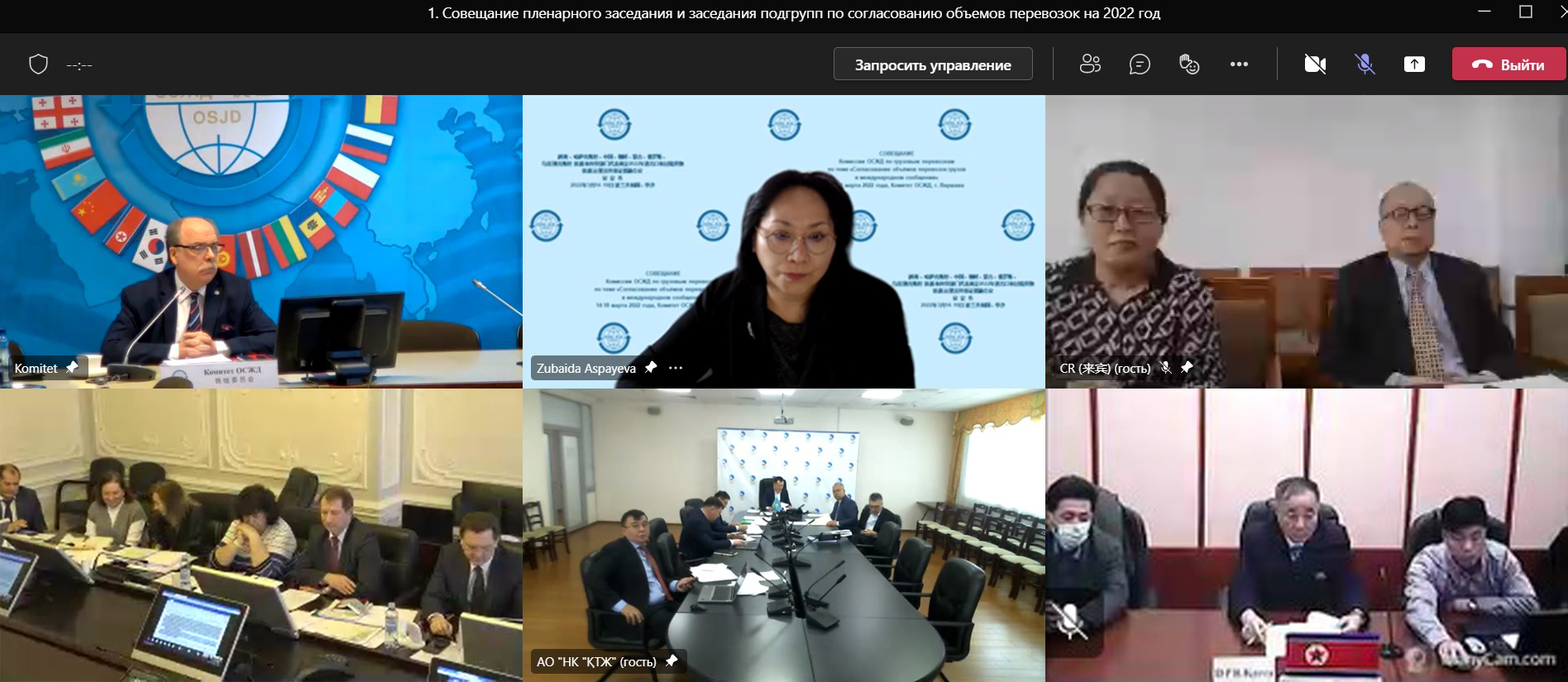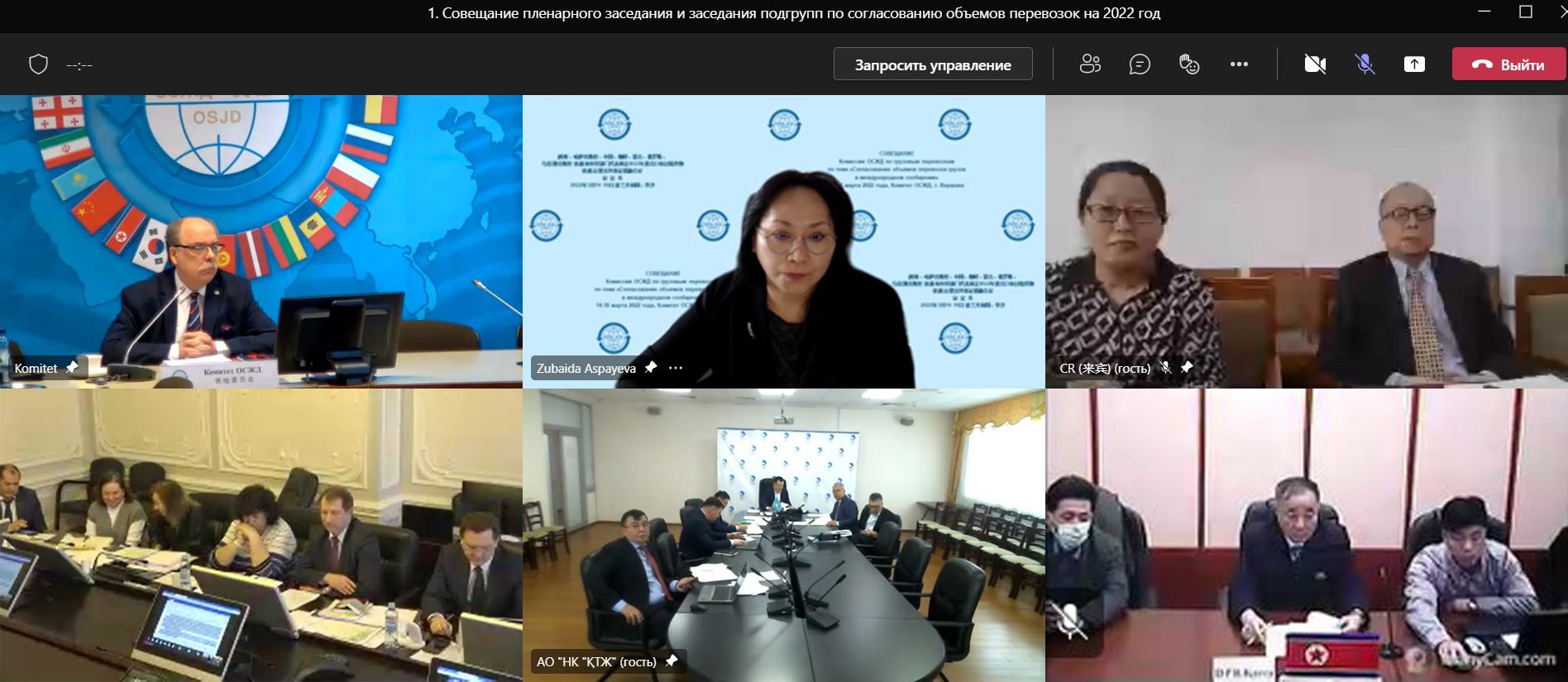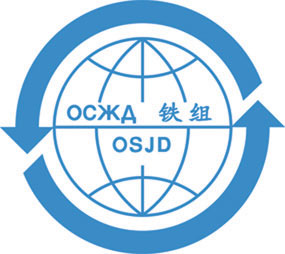Coordination of the volumes of the goods carried in international traffic by rail



In accordance with the Work Plan of the OSJD Commission on Freight Traffic for 2022 under the subject “Coordination of the volumes of the goods carried in international traffic by rail”, in the period of 14-18 March 2022 (OSJD Committee, Warsaw), the meeting was held in a videoconferencing mode of the representatives from the railways and foreign trade organisations of the Socialist Republic of Vietnam, Republic of Kazakhstan, People’s Republic of China, Democratic People’s Republic of Korea, Mongolia, Russian Federation and Republic of Uzbekistan for the coordination of the volumes of export, import and transit goods carried by railway transport for 2022.
The meeting was attended by the representatives of delegations from the railways of the OSJD member countries: Vietnamese Railway State Company (VZD), “Kazakh- stan Temir Zholy National Company” JSC (“KTZ NC” JSC), China State Railway Group Co., Ltd. (KZD), Ministry of Railways of the Democratic People’s Republic of Korea (ZC), Ulan-Bator Railway JSC (UBZD JSC), Russian Railways OJSC (RZD OJSC), Uzbek Railways JSC (O’zbekiston temir yo’llari) (UTI) and the representatives from foreign trade organisations of the Socialist Republic of Vietnam, Republic of Kazakhstan, People’s Republic of China, Democratic People’s Republic of Korea, Mongolia, Russian Federation and Republic of Uzbekistan, from the OSJD affiliated enterprises – UTLC ERA JSC and TransContainer PJSC, as well as from the OSJD Committee.
In his welcoming speech to the meeting participants, Mirosław Antonowicz, Chairman of OSJD Committee, pointed out that holding a meeting devoted to coordination of the volumes of the goods carried in international traffic by rail and development of technical and organisational measures for their implementation in a difficult global situation caused by the coronavirus pandemic was of great relevance for ensuring the smooth organisation of freight transportation in the Eurasian space in order to meet the needs of all sectors of the global economy, and lately including the healthcare sector, and wished the meeting participants every success in their work at the meeting.
Welcoming the meeting participants, Attila Kiss, Executive Secretary of the OSJD Committee, expressed his gratitude to all delegations for their participation in the meeting on decision-making as to important and practical issues related to the coordination of the volumes of the foreign trade goods in order to ensure the smooth organisation of their transportation in international traffic and the efficient use of railway transport.
The meeting was chaired by Zubaida Aspayeva, Chairperson of the OSJD Commission on Freight Traffic.
The meeting participants agreed on the following items of the agenda:
- Summing up the results of the volumes of transportation of goods for 2021;
- Coordination of the volumes of export, import and transit goods by railway transport for 2022 and their distribution by quarters and types of goods for each border crossing;
- Development of technical and organisational measures to implement the agreed volumes of transportation of goods for 2022;
- Deliberation of proposals made by railways;
- Agreeing on the date and venue of the next meeting in 2023;
- AOB.
Items 1-4 of the agenda of the meeting were discussed at the meetings of thirteen Subgroups, the composition of which was agreed by the delegations at the meeting.
The delegations from VZD, KZH, KZD, ZC, UBZD, RZD and UTI (Parties) informed the meeting participants on the implementation of the transportation volumes of foreign trade goods for 2021, carried between the countries, and the organisational and technical measures that were taken to provide them.
The Parties coordinated the volumes of export, import and transit goods for 2022 and their distribution by quarters, for each border crossing, and by types of goods.
For the purposes of identification of the names of goods, when coordinating the monthly plans for the transportation of goods, the Parties agreed on the nomenclature of export, import and transit goods.
The Parties agreed as follows:
- when signing contracts for the delivery of goods in excess of the volumes of freight transportation coordinated for 2022, the possibility of implementation of the carriage of such goods will be considered and decided only when the monthly operational plans have been agreed, taking into account the handling capacities of border crossings;
- transportation of goods in containers in the reporting and planned years will be measured, including 20-foot equivalent units (TEUs), while taking into account the loaded and empty containers.
Organisational and technical measures have been agreed to ensure the implementation of the agreed volumes of transportation of export, import and transit goods for 2022.
The parties agreed to continue their work to reduce the time spent by wagons and locomotives at the border stations as follows:
- compliance with the provisions and norms of SMGS and SI to SMGS;
- improving the uniformity of transportation of foreign trade goods (except seasonal) throughout the year, quarters and months;
- timely provided formation of trains and their departure strictly according to the agreed timetables;
- speeding up the turnover of locomotives and wagons;
- transportation routing of bulk goods (coal, coke, oil, oil products, metal ore, fertilisers, timber and others);
- timely cleaning of empty wagons after unloading and expediting their return to their own railways;
- improvement of technological processes for the handover of trains in international traffic in strict accordance with the requirements of SMGS, SI for SMGS and PGW;
- improving the systems of mutual exchange of information between the border railways on the availability, approach of goods and wagons to the border stations;
- taking the relevant measures to improve the technical condition of freight wagons, preventing the shipment of goods in wagons that do not meet the technical requirements of the “Rules for the use of freight wagons in international traffic (PGW)”.
To ensure the smooth handover of trains with foreign trade goods through the border crossings, the Parties will carry out monthly planning of freight transportation. The volumes of transportation of foreign trade goods will be monthly transmitted for coordination by telegrams, fax, telex or e-mail between the central authorities of the railways involved in the transportation, according to the established nomenclature of goods no later than 10 days before the start of the planned month.
Replies on the accepted traffic volumes must be reported within three working days upon receipt of the request.
In the telegrams on coordination of the volumes of transportation of foreign trade goods, the country of departure, the country of destination, the name of the border stations, the name of the goods, the number of tons, wagons or containers (with indication of their dimensions in feet and type) will be indicated.
In addition, to coordinate transportation of goods to the third countries, the names of carriers on the European railways will be indicated in accordance with Appendix 5 “Information Guide” to the SMGS, destination stations and forwarding organisations paying for transit to the railways.
Goods that were not envisaged for transportation through the border stations according to the plan, as well as goods presented for transportation as a result of additional contracts can be accepted for transportation only after obtaining consent to their acceptance from the railways involved in transportation.
Once the acceptance of an additional amount of goods has been agreed, the border railways and stations will be simultaneously informed about the corresponding increase in the average daily rate of transfer of goods by nomenclature and in tons.
The carrier that accepted the application for the carriage of goods is obliged to agree it in accordance with the established procedure. The carriers must respond within three business days of receiving a request for transportation.
For the purpose of reduction of time for coordinating the volumes of goods and conditions of transportation of goods, for the exchange of information, the electronic means of communication of specialists directly responsible for such issues will additionally be used.
The parties have agreed the request form for coordinating the transportation of goods in containers as part of container trains, while the exchange of messages will be carried out by e-mail.
The parties will make every possible effort to organise operational cooperation in terms of removing barriers that impede regular transportation.
In accordance with the agreed monthly volumes of transportation of goods and additional applications for transportation of individual goods, the border stations must ensure unimpeded reception and exclude cases of unreasonable refusal to accept the agreed volumes of cargo. The goods that are loaded according to the plan of the previous month, but will arrive at the border stations in the next month, will be accepted without hindrance.
The Parties will take the necessary measures to comply with the requirements of the SMGS Agreement in terms of high-quality processing of transportation documents, preparation of containers, packaging, marking, compliance with the rules for loading and securing goods, sealing wagons and containers, as well as by reliable indication and correspondence in the transportation documents of the number and signs of seals to the number and signs of seals actually located in the wagon and container.
The Parties will take measures for transportation of freezing goods mainly in the 2nd and 3rd quarters and will inform their consignors about the need to take preventive measures against their freezing in the winter. Oil and viscous oil products must be transported in the tanks equipped with the bottom discharge devices.
When dangerous goods are transported, measures will be taken to unconditionally comply with the provisions of the SMGS Agreement in terms of entering information into the transport documents provided for by the “Rules for the Carriage of Dangerous Goods” (Annex 2 to the SMGS) and high-quality application of hazard signs and markings placed on the wagons, containers and goods.
The parties will transmit a request to the foreign trade organisations of the Socialist Republic of Vietnam, Republic of Kazakhstan, China, DPRK, Mongolia and Russian Federation, consigning the goods to be reloaded, to provide under contracts concluded the containers and packaging that can ensure the safety of goods during transportation and reloading, as well as the formation of goods packages that do not require examination for reloading.
For the purposes of speeding up the reloading operation and ensuring the safety of goods, measures will be taken to optimise the use of containers during transportation of goods.
The parties agreed the possibility of transportation of goods in the type of containers of open top.
In order to avoid a long idle time of wagons at the border stations when goods are transported by transit railways, column 23 of the SMGS consignment note is to indicate the name of the payer for each of the carriers.
In the event of accumulation of the wagons loaded with export goods (including goods in containers) on the border railways, the central railway authorities, border railways and border stations will take joint measures to improve interaction and increase the daily reception and handover of trains in excess of the established transfer rate. At the same time, the railway of the receiving party must provide the required number of empty wagons (including flat wagons) for loading at the border station in order to increase the efficiency and volumes of reloading.
The parties agreed to inform the foreign trade organisations and freight forwarders (operators) about the amendments and sup plements made in the SMGS Agreement and SI to SMGS.
To optimise the operation of rolling stock, the Parties will work with all stakeholders engaged in transportation (rolling stock opera- tors, freight forwarders, consignors, etc.) to the extent possible to consider the logistics schemes that reduce the mileage of empty wagons.
To timely and efficiently meet the needs of consignors in transportation of goods and improve the use of rolling stock and better the operation of border crossings, the Parties deemed it necessary to carry out the activities agreed for 2022.
The delegation of the Russian Railways OJSC informed the meeting participants about a new logistics intermodal service based on INTERTRAN information technology, which provides for the interaction of sea, rail transport and regulatory authorities in the implementation of intermodal transport in a completely digital format.
The meeting participants agreed to include into the draft Work Plan of the OSJD Commission on Freight Traffic for 2023 the implementation of work under the subject “Coordination of the volumes of the goods carried in international trafiic by rail”.
The head of delegation of the Republic of Uzbekistan informed the meeting participants that Uzbekistan was prepared to host a regular meeting of representatives of railways and foreign trade organisations of the Socialist Republic of Vietnam, Republic of Kazakhstan, People’s Republic of China, Democratic People’s Republic of Korea, Mongolia, Russian Federation and Republic of Uzbekistan on the coordination of the volume of transportation of export, import and transit goods and on the development of technical and organisational measures to implement the agreed volumes of transportation of goods in February-March 2023 in the Republic of Uzbekistan.
The meeting participants gratefully accepted the kind-hearted invitation of the delegation of the Republic of Uzbekistan.
The Chairperson of the meeting expressed her gratitude and appreciation to the delegations of the railways of the OSJD member countries and the meeting participants for their work performed at a high professional level when the agenda items were deliberated and the agreed decisions were made.
The meeting participants underlined the high level of organisation and conduct of the meeting in the videoconferencing mode and expressed their gratitude to the Chairperson of the meeting and the staff members of OSJD Committee.
